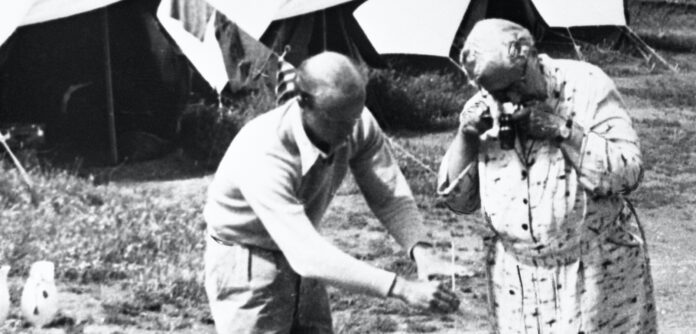DUBAI: The late British novelist Agatha Christie — known as the “Queen of Crime” — was a woman of extraordinary talent. Despite having no formal education as a child, she taught herself to read at five-years-old, and by the time of her death, aged 85 in 1976, had written 66 detective novels, including the widely acclaimed “Murder on the Orient Express” and “Death on the Nile.”
It generally took this prolific writer around three to four months to write a novel. “There’s nothing like boredom to make you write,” she once said. A peculiar quote from someone whose life — full of adventurous journeys and emotional ups-and-downs — was anything but dull.
This year is the 100th anniversary of Christie’s 10-month international trip, which took her as far as South Africa, Australia, New Zealand, and Hawaii, where she learned how to surf.
Poster for 1974 film of Murder on the Orient Express. File/Getty
Christie, who was then in her early thirties, was travelling with her first husband Archie, an army officer. “Today everyone would shudder, but (back then) it was called an ’empire’ tour,” Laura Thompson, an Agatha Christie biographer, tells Arab News. “Archie was sort of working and they were almost in a quasi-ambassadorial role.”
Archie’s infidelity led to the couple parting ways in 1928, after which the unorthodox Christie made her way — alone — to the Middle East aboard the iconic luxury train connecting Paris to Istanbul after which she would later name one of her novels.
“I thought: It’s now or never,” Christie later reflected on this bold decision. “Either I cling to everything that’s safe and that I know, or else I develop more initiative, do things on my own.”
“I suppose the (most daring) thing she did was when she traveled on her own,” says Thompson. “It would be her salvation in some way. To go to Iraq, which back then was very different, on your own on the Orient Express… that, to me, is impressive. She was intent of getting rid of English bores who wanted her to go play tennis. She was a proper traveler.”
As evidenced by her titles, “Murder in Mesopotamia” and “They Came to Baghdad”, the sights and sounds of the Middle East made a huge impact on Christie.
In a way, her time in the Arab world helped launch her comeback after things had gone horribly wrong with her marriage. “How much I have loved that part of the world. I still love it and always shall,” she said of the region.
Her first encounter with Egypt, then a British protectorate, took place in 1910, when she was a young debutante at a coming-out party. It was there that the 19-year-old Christie actually wrote her first romance story “Snow Upon the Desert” (which went unpublished).
Her second and final marriage, to archaeologist Max Mallowan who was 14 years her junior, further intensified her interest in the Arab world. The pair met in Iraq, married quickly in 1930, and over the next 18 years went on archaeological digs in Syria and Iraq, both custodians of rich civilizations. “All these worlds would never have come to her if she’d stayed with Archie,” says Thompson.
Such expeditions were challenging, not least because of the region’s hot weather and lack of air-conditioning, but Christie was up for it. “She was quite game and tough,” says Thompson. “I remember her daughter, Rosalind, saying to me: ‘Everything she did, she tried her best to enjoy.'”
In the 1940s, Christie chronicled her Levantine experiences in a non-fiction account called “Come, Tell Me How You Live” — a work which Thompson suggests was a gift to her husband. “She helped finance his distinguished career and helped on the digs,” she explained. “I think as she got more famous, it was a refuge to be there, to be Mrs. Mallowan and not the celebrity Agatha Christie.”
One of Christie’s most famous Arab-related novels, “Death on the Nile,” has recently been adapted into a film by Kenneth Branagh. Christie was 47 when the book, inspired by her journey up the Nile on board a steamer in the winter, was published in 1937.
Laura Thompson, author of Agatha Christie “A Mysterious Life.” Supplied
The plot follows Belgian detective extraordinaire Hercule Poirot as he investigates the murder of a socialite on a Nile cruise aboard the SS Karnak. “It’s an unusually descriptive book,” says Thompson. “You get these quite powerful descriptions of the Nile and the Pharaohs.”
The biographer believes that “Death on the Nile” was the start of an evolution in Christie’s writing.
“There does seem to be a slightly stronger emotional undercurrent that has elements of autobiography,” she observes. The narrative contains a love triangle, something that Christie lived through herself and that would certainly have had painful connotations for her.
Though written decades ago, Christie’s books still resonate and capture the public’s imagination and hearts. More than two billion copies of her novels have been sold. “Her boldness is thrilling and at the same time she translates easily,” says Thompson. “She’s like The Beatles. What would the world be without her?”

